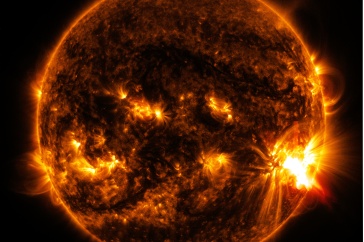
Lynn Kistler, UNH professor of physics and director for the UNH Space Science Center, is being honored?by the global Earth and space sciences community for her dedication to advancing space science. Kistler was recently?announced as the American Geophysical Union (AGU)'s 2023 James Van Allen Lecture recipient, which recognizes significant contributions to the field of magnetospheric sciences —?the study of the magnetic bubble around the Earth?and its interactions with charged particles from the sun and outer space.??
The James Van Allen Lecture award is presented two out of every three years; Kistler will present the lecture at the 2023 AGU Fall Meeting,?which will convene more than 25,000 attendees from more than 100 countries in San Francisco and online Dec.?11-15,?2023.?
During her career, Kistler has used measurements of ion composition to study the impacts of the heavy ions throughout the magnetosphere.?Her research has shown that ions from both the dayside and the nightside auroral zone are accelerated into the magnetosphere during geomagnetic storms, and become the dominant populations in some regions.?She has also been involved in the design and testing of the ion composition instruments that make these studies possible. Kistler?has served on the NASA Heliophysics Advisory Committee, and is currently serving as the chair of the Magnetospheres Panel for the National Academy of Science Solar and Space Physics Decadal Survey, which sets science priorities for the coming decade.?She became an AGU Fellow in 2016.
"I am very honored to be recognized by the AGU Space Physics and Aeronomy Community in this way, especially to give the lecture named after James Van Allen, one of the pioneers of our field," Kistler notes.?
The?UNH Institute for the Study of Earth, Oceans, and Space (EOS)?is UNH's largest research enterprise, comprising six centers with a focus on interdisciplinary, high-impact research on Earth and climate systems, space science, the marine environment, seafloor mapping and environmental acoustics. With approximately 100 principal investigators managing more than 400 individual grant awards, and with annual expenditures exceeding $95?million, EOS fosters an intellectual and scientific environment that advances visionary scholarship and leadership in world-class and graduate education.??
?
-
Written By:
Rebecca Irelan | Institute for the Study of Earth, Oceans, and Space | rebecca.irelan@unh.edu | 603-862-0990



















































